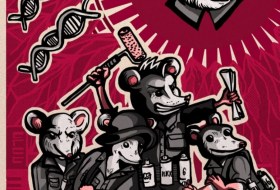News
"El Gen de la Discordia", written by a graduate of Unicauca awarded by Minciencias
The story written by Jorge Alberto López Guzmán, a graduate of the Political Science and Anthropology program at the Universidad del Cauca, was the winner during the virtual writing workshops that were held within the framework of the public communication strategy of science 'Todo es Ciencia '.
El Gen de la Discordia is the story written by Jorge Alberto López Guzmán, a graduate of the Political Science and Anthropology program at the University of Cauca, selected by Minciencias and “Todo es Ciencia”, as the winning story of the writing workshops that were held at National level. The initiative arose through the public communication strategy of science 'Todo es Ciencia', belonging to the Ministry of Science, Technology and Innovation (Minciencias), where virtual writing workshops were held nationwide, specifically short stories, where The objective was to link scientific writing to creative writing, seeking to combine these two types of narratives that are often believed to be distant.
In this context, Jorge Alberto Guzmán participated with the story called “El Gene de la Discordia”, which narrates a dystopian pandemic situation caused by modified mice in a laboratory, putting into context the first patent in the history of a genetically modified animal in the decade of the 80s of the 20th century called the Oncomouse (a mouse with genes injected into its embryo to increase susceptibility to cancer).
“The story attracted so much attention that it was selected by the editorial team of “Todo es Ciencia” to have the accompaniment of the Colombian writer Catalina Navas with whom they worked during July and August. Subsequently, the editorial team of “Todo es Ciencia” highlighted the writing, creativity and context of the story and selected it as the winning story of the writing workshops that were held nationwide, ”said the author.
The writing can be read by any public. It has a specific conceptual narrative in relation to biology and genetics, since it seeks to link a specific and real situation with an undesired context in which social, scientific and historical variants stand out. “Combining scientific writing with creative writing is something that many writers have done, seeking that from narratives such as short stories it is possible to elucidate situations where science has the leading role and stories can oscillate between imaginary contexts to futuristic realities, that is why he uses a specialized language without absent fictitious and creative arguments”.
“My main interest was to expose from the narrative of the story, the phenomenon of genetic modification in animals, in particular of that type of mouse that is the most widely used for the study of human diseases. That's why he recreated a dystopian situation where mice rebel against the pharmaceutical industry and cause a pandemic. "
The idea and the writing process was started by the author six years ago when he did his thesis in Political Science. “I inquired about a topic related to biology and chemistry from politics, that led me to return to the foundations of natural sciences and delve into some topics. Similarly, in my Master's thesis in Government and Public Policy I took up some aspects of my first thesis and in this case I not only had to inquire about natural sciences, but also about health sciences. In this sense, I have been linking the social sciences with the natural sciences. In the same way, I have always had a taste for writing short stories, essays and prose poetry, where I have received some recognition and I have also been published by some Latin American magazines. Therefore, my main publications have been academic in nature, but I have also ventured into creative writing”.
Finally, the writer invited people to read this story and to fall in love with writing as a way of reclaiming the imagination, since in the end writing is a form of catharsis in the face of life and of rebelling against the impositions of everyday life.
More Info:
Email: lopezg@unicauca.edu.co


